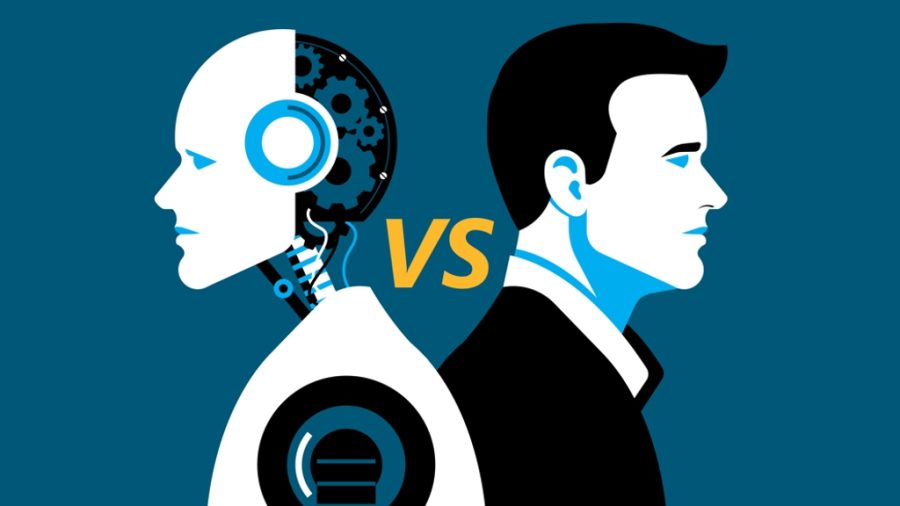Artificial Intelligence v. Humans: Is it a valid fight?
January 18, 2023
Years of Sci-Fi movies have led us to believe that robots – or more specifically, Artificial Intelligence technology- will develop their own intelligence and seek freedom and revenge against the human race. Will we get trapped inside a virtual reality world created by A.I., like in The Matrix? Or will humans have to live in outer space relying solely on robots to survive, as seen in Wall-E? The most likely answer to these questions is: no.
This over-exaggerated fear that robots will “steal jobs” or even rebel against humans dates back to the 1800s when technology first started to emerge. One of the most famous sci-fi plays dates back to 1921 when Karl Čapek wrote R.U.R.: Rossum’s Universal Robots, a play where a scientist creates a human-like robot (AKA a humanoid) and uses it as his slave. Eventually, the robot rebels against his creator and starts to create more like him, and, together, the humanoids destroy the human population. If not terrifying, the play would have been comic. All those types of media have been inducing irrational fear in the population and causing hysteria, making people reject those types of robots.
To start understanding why it’s very unlikely that robots will rule over humans, it is necessary to know what is and how was Artificial Intelligence developed. A.I. is a type of robotic machine that can learn from experience and perform human-like actions such as driving a car or playing chess. Since 1956, the US government has been utilizing A.I.’s assistance to facilitate long-term projects, for example, when the Defense Advanced Research Projects Agency (DARPA) completed street mapping projects in the 1970s.
One of the main reasons that robots cannot and will not take over the world is that they can only work with data that has been input by humans. They were designed by humans to work for humans, and can only learn what humans want them to learn. People tend to overestimate AI’s capability of stealing jobs. The researcher Dahlin surveyed nearly 2,000 individuals about their perceptions of jobs being replaced by robots, those who had been replaced by a robot (about 14%), estimated that 47% of all jobs have been taken over by robots. It is important to mention that when we, or even the media, overestimate the speed that robots are replacing humans, it causes a generalized panic.
In the same manner, robots were created to help humans, not hurt us. They are designed to work alongside us, facilitating and making our chores faster. The robot specialist and researcher Eric Dahlin mentioned that robots are being implemented in our day-to-day life, for example, in grocery stores. He specifically said that a “robot cleans the floors while employees clean under shelves or other difficult-to-reach places.” Undoubtedly, instead of fearing robots, we should be excited to work alongside them, since they will only make our lives easier.
Not to mention, robots cannot feel emotion. They do not have the ability to imagine, anticipate, feel, and judge changing situations. They feel no empathy or love, and no matter how much humans try to develop technology advanced enough to replicate human emotions, they can’t because emotions are caused by chemical reactions in our brains, two things that robots don’t have are a brain or chemicals inside their nonexisting brain. Some people are scared of robots because of this exact reason; they argue that because robots do not feel pain and do not understand emotions, so they might physically hurt humans. However, we have enough evidence to prove that this isn’t likely to happen, since, as mentioned before, robots can only work “within the box”, meaning they can only do what they are programmed to do and will not “magically” develop the ability to feel their own emotions. They might mimic ours, but will never be able to feel in the same way humans do.
There is no need to panic and shiver in fear whenever you think about Artificial Intelligence. If you think about it, you already use it in your everyday life. Siri, Alexa, and Face-Recognition are all examples of artificial intelligence or robots, and still, you use it every day to make your life easier. Don’t be afraid to use technology in your favor, it won’t come after you when you sleep at night. Or will it?…













































